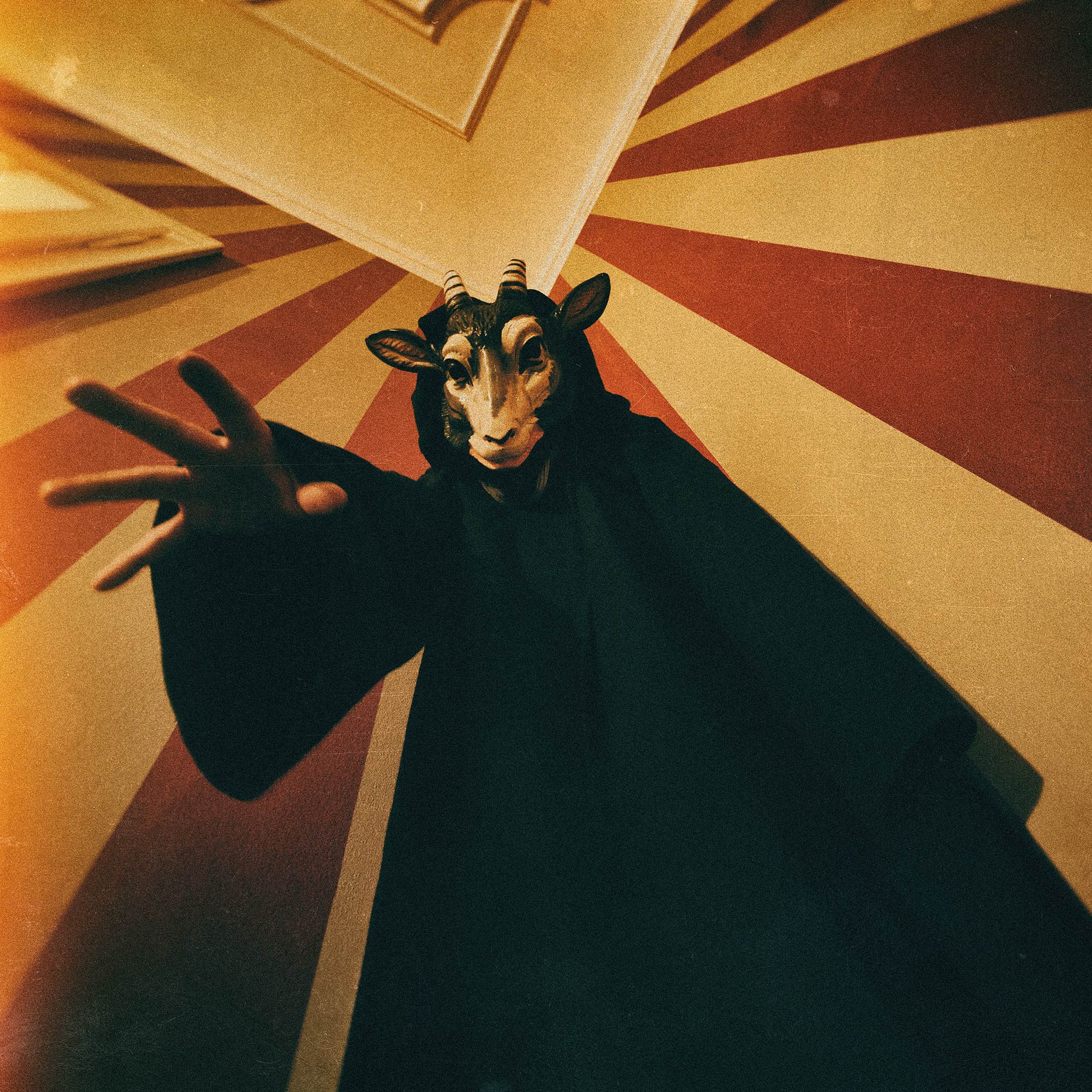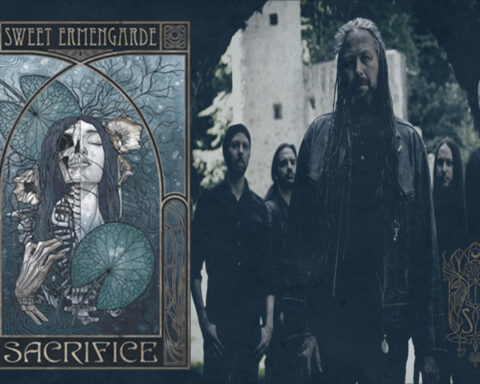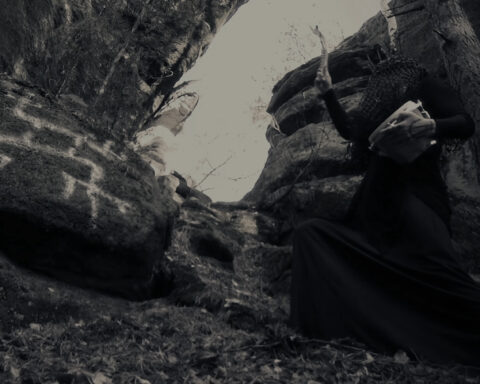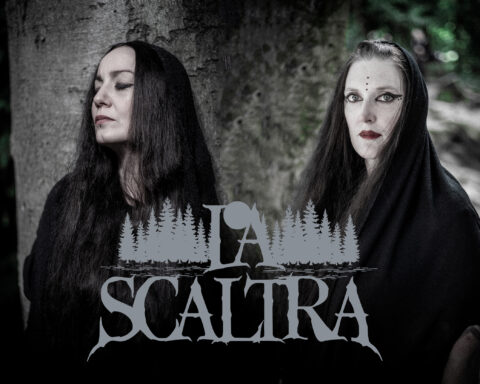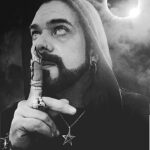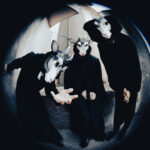[german version – english below]
Zunächst ein „Welcome goats!“ bei Solar Lodge, euer neuestes Werk: „Endgame 69“ erscheint am 21.Juni 2019. Welche Gründe gibt es, dass ihr euch für Solar Lodge als Label entschieden habt?
Danke. Die Freude ist ganz auf unserer Seite. Es war der nächste logische Schritt mit einem Partner zusammen zu arbeiten, der sich vor allem um die CD Verkäufe kümmert und das mit einem professionellen Vertrieb im Rücken. Aufnahme + Wiedergabe veröffentlicht weiterhin die Vinyl Ausgabe. Wir sind gespannt, wie sich diese Vorgehensweise auswirken wird.
Das nunmehr fünfte Album erscheint in einem auffällig bunten Style, ein rot-orange, die Ziegen posieren vor einem Plattenteller, einer „Dream-Machine“ mit Ziegenköpfen…alles sehr stimmig. Es ist euch bisher bereits oft gelungen, euer thematisches Konzept im Cover Artwork auszudrücken. Jetzt erscheint es mir perfekt gelungen. Könnt ihr bitte etwas zur Entstehung/Idee erzählen.
Die Idee mit der Dream Machine hatte ich schon lange. Sie stand sogar schon lange bevor es noch einen einzigen Ton Musik gab. Ich hatte eben genau dieses Bild vor Augen das man jetzt am Cover sieht. Es passt einfach hervorragend zu dem ganzen Konzept der Platte. Vielleicht sollte ich den Lesern kurz erklären, was es damit auf sich hat: Eine Dream Machine ist eine Leuchte, die mittels des Stroboskopeffekts eine optische Stimulierung des Gehirns bewirkt. Die Apparatur wurde Ende der 1950er Jahre von den Künstlern Brion Gysin und Ian Sommerville entworfen. Bekannt wurde sie auch durch den Schriftsteller William Burroughs und gerade bei den Hippies erfreute sich das Ding großer Beliebtheit. Eine Dream Machine ist definitiv trancefördernd und mit diversen bewusstseinserweiterten Stimuli traf das genau den Nerv der Zeit.
Das Altamont Festival 1969 in Kalifornien vereint Tragik, Chaos und die Unberechenbarkeit von Menschen unter Drogen. Meredith Hunter wird während des Live Gigs der Rolling Stones von einem Hell Angels Mitglied erstochen. „Altamont Apocalypse“ : steht dieser Song explizit für diesen Mord oder auch für das Ende der Hippie-Ära?
Ja, Altamont stand im Nachhinein tatsächlich für das Ende der Hippie Ära, verkörpert wie kein anderes Ereignis die Schattenseiten dieser Zeit, die oft vergessen werden. Auch zeitlich passte es perfekt, wenn man bedenkt das sich das Ganze im Dezember 69‘ abspielte – Endgame 69 sozusagen. Wir waren immer schon fasziniert von diesen Ereignissen. Ein gutes Beispiel wozu Ignoranz und Arroganz führen können. Der Song selbst ist vielleicht einer der zugänglichsten Stücke des Albums. Es ist das letzte Aufgebot vor dem Fall.
Zwei der neuen Songs sind erneut mit Gastsängerinnen aufgenommen. Christina Lessiak singt „Kali’s Tongue“. Medina Rekic interpretiert mit ihrer punkig-revolutionären Stimme den Coversong „1969“ von den Stooges. Beide Songs sind phantastisch gesungen und instrumentiert. Wie kam es dazu, zwei Sängerinnen zu gewinnen?
Christina war ja schon beim letzten Album mit dabei. „Church of the Goat“ wurde sehr von ihrer wandelbaren Stimme veredelt. Da war es naheliegend, sie nochmal einzuladen. Allerdings war mir wichtig, dass sie diesmal eine ganz andere Art von Song interpretiert. Und so schrieb ich „Kali’s Tongue“ schon mit ihr im Hinterkopf. Medina war dann sogar ein last Minute Ding. Wir haben länger nach Sänger oder Sängerinnen für den Song gesucht. David hatte dann die Idee mit Medina, und ja, es stimmt, ihre Stimme passte ganz wunderbar zu dem Track und wir waren sehr froh, dass die Wahl letztendlich auf sie gefallen ist.
Habt ihr bei der Auswahl der Instrumentierung der einzelnen Songs auch für die 60-er Jahre bewusst typische Sounds, Instrumente verwendet? Wurden diese dafür extra angeschafft?
Das schwierigste an dem Album war sicherlich eine musikalische Sprache zu finden die dem Thema gerecht wird. Es sollte psychedelisch sein, klar, eindeutiger dieser Zeit verhaftet, aber auf keinen Fall irgendwie angestaubt klingen und obendrein auch eindeutig als TDATU erkennbar sein. Also musste ich erstmal überlegen und ausprobieren welche Instrumentierung hier passend ist. Nach vielen Versuchen kamen wir dann auf den Trichter uns auf orientalische Klänge zu konzentrieren, mit den typischen TDATU Tribal Drums, mitunter auch unterschwellig etwas rockiger und organischer. Das Ganze allerdings auch immer mit moderner Elektronik verfeinert und eher in dunklen Soundfarben gehalten. Das machte dann alles auch total Sinn. Gerade nah- und fernöstliche Klänge wurden damals erstmals in die westliche Popkultur integriert. Ich finde ja außerdem, dass TDATU immer schon eine sehr psychedelische Band war, die Art der psychedelic hat sich nun vielleicht etwas verändert, aber trippy waren wir immer schon. Gerade auch auf dem letzten Album Folk Horror. Nimm Tracks wie „Alchemical Landscape“ oder „Fiend in the Furrows“, hier kann man, wenn man genau hinhört, schon die Saat hören die sich auf :Endgame 69: nun so richtig entfaltet hat.
:Endgame 69:, ein wirklich eindeutiger Albumtitel. Mich interessiert besonders, warum die Schreibweise mit den ::? Gibt es dazu eine Bedeutung? So ist das „Endspiel/Abschlussspiel“ das Ende von: den Hippies, der musikalischen (Hippie-) Zeit, den Umbrüchen jener Jahre, die die Musikkultur sehr geprägt hat?
Als der Entschluss stand, sich mit diesem Themenkreis zu befassen, also sehr verkürzt gesagt; „the dark side of hippie“, tauchte sofort dieser Titel auf. Das ging in Sekundenschnelle auf einer Rolltreppe in Moskau (wir waren gerade dort, um ein Konzert zu geben). Davor haben wir lange herum überlegt was das nächste Thema sein könnte. Es gab einige Ideen, die dann wieder verworfen wurden. Es ist ja bei mir oft so, das Erste ist der Albumtitel. Egal bei welcher Band. Auch bei Whispers In The Shadow ist es so. Manchmal ist es umgekehrt, aber bei ca. 80% steht der Titel tatsächlich als erstes und hat somit einen großen Einfluss auf das Songwriting an sich. Die Schreibweise mit den : bedeutet rein gar nichts. Uns gefallen einfach die Punkte gut 😉 Wir haben das ja bei fast allen Alben so gemacht, das haben wir einfach beibehalten. Schaut irgendwie schick aus und macht sonst keiner. Es wäre ein Einfaches hier jetzt eine super Geschichte zu erfinden wie: diese Punkte stehen für den Anfang und das Ende. Aber dadurch, dass es zwei Punkte sind, fließt auch was heraus. Somit verbinden wir hier die Vergangenheit 69 mit der heutigen Zeit, die in einem ja auch das Gefühl eines „Endgame“ auslöst. Oder irgend so einen ausgemachten Unsinn. Die Wahrheit ist oft profaner als man glaubt. Oder aber unser Unterbewusstsein versucht uns damit etwas zu sagen was wir selbst nicht verstehen? Möglichkeiten gibt es viele. TDATU lassen Vieles offen, um am Ende doch wieder alles auszuklammern.
Eure erste Single „Satanic (don’t) panic” hat mich als TDATU Fan sofort mitgerissen, ich würde mich sogar verleiten lassen zu sagen: „so klingen die Ziegen, so mag ich das“. Siehst du das bei diesem Song auch ähnlich?
„Satanic“ war so ziemlich der letzte Song, der für das Album geschrieben wurde und war von Anfang als klassischer TDATU konzipiert, aber eben mit den Sounds, die wir auf diesem Album verwendet haben. Ich wollte auf jeden Fall noch einen Track, der die Brücke zu den Alben davor schlägt. Viele der Tracks auf :Endgame 69: sind ja doch recht anders als das was wir davor gemacht haben. Auch wollte ich einen Track, der ganz klar auf die Tanzfläche schielt. Es ist tatsächlich unser typischster Song auf dem Album. Ich mag ihn sehr.
Edie Calie hat das Video zur Single angefertigt. Entstehen die Ideen zur filmischen Umsetzung hauptsächlich zwischen euch drei Bandmitgliedern oder wird gar mit Edie zusammen überlegt, wie sich ein Song verfilmen lässt?
Zuerst wird überlegt welcher Song sich für ein Video eignen könnte, dann setzte ich mich mit Edie hin und wir beginnen Ideen zu spinnen. Eine ganze Menge davon kommt von ihr! Und da sie auch für Schnitt und Regie verantwortlich ist, ist das nicht zu unterschätzen! Wir lassen ihr da auch freie Hand. Vieles entsteht dann aber auch erst vor Ort. Wir sind da sehr spontan und kreativ und sehr gut darin mit dem zu arbeiten was wir haben. Es gibt zwar Szenen, die wir uns vorher überlegt haben, aber am Ende passieren dann auch immer Dinge, die wir so nicht geplant hatten. Es ist ein wunderbares, kreatives Chaos was da passiert! Ich liebe diese Arbeitsweise. Wenn man zu viel plant geht ja dann doch immer wieder etwas schief. Das gilt übrigens auch für die Musik an sich. Ich würde die Arbeitsweise von TDATU insgesamt als einen wahren „stream of consciousness“ bezeichnen. Das war von Anfang an die Stärke dieses Projekts.
Edie Calie ist auch Verfasserin des in limitierter Auflage erschienenen „Deluxe“ Pakets: CD & Buch „The companien book“. Was erwartet den geneigten Leser und TDATU Fan bei dieser Geschichte?
Es handelt sich dabei um eine Kurzgeschichte, die dem Album einen Rahmen gibt. Es finden sich Elemente des Albums darin, allerdings macht die Geschichte auch für sich allein Sinn. Mehr will ich hier aber nicht verraten. Die Geschichte ist auf Deutsch und Englisch enthalten, sowie weiteren Informationen zum Album auf Deutsch und Englisch.
„Kali’s Tongue“ : ein Mantra, welches eindringlich, atmosphärisch, orientalisch gesungen und instrumental wunderbar umgesetzt wurde. Die Göttin Kali steht für Tod, Zerstörung aber auch für eine Erneuerung. Bei diesen Schlagworten entstehen bei den meisten Hörern sofort Bilder im Kopf. Bitte erzählt etwas zum brandneuen Video. (war es klar, dass das zweite Video zu diesem Song entstehen soll, welche Grundideen gab es für die Umsetzung, wo wurde gedreht…)
Wir haben schon länger überlegt, welcher Track die zweite Single werden sollte und die meisten Ideen und Bilder kamen uns eben bei diesem Track. Hinzukommt, dass ich schon lange mit einem Darsteller zusammenarbeiten wollte, dieser sollte dann auch die Hauptrolle in dem Video übernehmen und die Ziegen selbst eher nur Begleitung sein. Der Track eignete sich hervorragend für so eine Idee. Es war klar, wir brauchen einen Kali Charakter dafür. Gedreht haben wir in der Nähe von Wien. Wo genau verrate ich aber nicht. Der Dreh selbst ging bis spät in die Nacht, war aber einer der interessantesten und entspanntesten Drehs, die ich bisher hatte.
Der Mentalist, Mystery Entertainer und Dark Cabaret Performer Thomas Thalhammer ist Akteur in eurem neuen Video. Als ich von dieser Beteiligung gehört habe, dachte ich sofort: welch gelungene Wahl! Wie kam es dazu? Konntet ihr Thomas sofort dafür gewinnen?
Ich kenne Thomas schon lange und mag das, was er macht sehr gerne. Wie oben schon erwähnt suchten wir nach einem Darsteller/ Darstellerin für das Video. Wir fanden dann die Idee eine weibliche Göttin von einem Mann spielen zu lassen sehr reizvoll. Das Auflösen von Geschlechterrollen kann man nicht oft genug vorantreiben. Er war auch sofort Feuer und Flamme und nach dem Dreh kann ich sagen: die Wahl war genau richtig. Aber daran habe ich auch davor nie gezweifelt. Er machte alle verrückten Ideen mit und hatte auch eigene, kreative Einfälle, die wir umsetzen konnten.
Euer Markenzeichen sind die Masken. Fotos, Cover Artwork als auch eure Merch Artikel tragen ein unverkennbares „Branding“. Dies gelingt nicht vielen Bands. Der spanische Künstler und DJ Billy Phobia kreiert die Bilder für die T-Shirts. Hat er „freie Hand“? Ich nehme an, Billy bekommt das Album dann exklusiv vorab zu hören und lässt sich davon dann inspirieren für ein neues Druckmotiv?
Danke. Und wenn ich dir sage, dass das alles ganz natürlich ohne einen großen Plan soweit gekommen ist, ist das tatsächlich die Wahrheit. Mit Billy haben wir einen ganz fantastischen Grafik Designer an der Hand, der mich jedes Mal aufs Neue begeistert und überrascht. Immer wenn ein neues T-Shirt Motiv in meinem Posteingang wartet ist das ein spannender Moment. Und wenn ich es dann öffne, entfleucht mir immer ein lautes, positives „Ahhhhhhhhh“. Ich erzähle ihm im Vorfeld von den Themen des Albums und schicke ihm auch schon das Album. Manchmal gibt es von mir schon eine etwas konkrete Idee, wie z. B: beim „Wicker Goat“ Shirt von der Folk Horror Album Phase. Das sollte eben das Wicker Man Film Plakat auf Ziege sein. Beim neuen Design kam aber alles von ihm. Ich halte es für unser bisher bestes Shirt Design. Für die Cover Fotos zeigt sich Maria Wagner verantwortlich die einmal mehr ganz großartige Arbeit geleistet hat. Und last but not least muss ich auch Filip Trax erwähnen der das eigentliche Cover Design macht, ohne ihn geht, was das angeht, gar nichts.
Instrumentale Musik zu schreiben und dabei eine gewollte Stimmung zum Thema zu erzeugen, ohne Text. Ich stelle mir das durchaus schwierig vor. Hast du dabei mittlerweile Übung beim Songwriting? Im Interview des Sonic Seducer sprichst du von der bisher längsten Produktion eines TDATU Albums. Welche Hintergründe gibt es dazu?
Wenn mich jemand fragt, welche Musik wir machen sage ich immer es ist Soundtrack-Musik nur ohne Film. Ich glaube das trifft es ganz gut. Wenn ich Musik schreibe habe ich meistens Bilder im Kopf. Diese dann auf Musik zu übertragen fiel mir immer schon recht leicht. Mitunter, so wie oben bereits angesprochen, dauert es etwas, um eine musikalische Sprache zu finden die dem Thema gerecht wird. Dafür lese ich Bücher über diese Themen, sehe mir Filme oder Dokumentationen darüber an, mache mir Notizen und versuche mich eben ganz in diese Stimmung zu versetzen. Der Rest geht dann von selbst.
Ich möchte dich mit Aussagen zum „LSD-Papst“, „Alchemist des Geistes“ alias Timothy Leary konfrontieren. Er steht aus meiner Sicht exemplarisch für die 60/70-er Jahre und dem Drogenkonsum.
„The only hope is dope”: dein erster Gedanke dazu. Man muss hier natürlich ganz klar unterscheiden, um welche Drogen es bei Leary ging. Er meinte damit rein die psychedelischen, bewusstseinserweiternden Drogen wie eben LSD, Psylocibin etc… Man muss sich dafür auch in diese Zeit versetzten, die Leute und allen voran Leary dachten ja wirklich sie könnten mit Hilfe dieser bewusstseinserweiternden Substanzen die Welt von Grund auf verändern. Viele sahen LSD und dergleichen nicht als Partydroge, es ging nicht darum einfach nur Spaß zu haben, sondern es ging den Leuten um wesentlich mehr. Und so ist dieses Zitat wohl auch zu verstehen. Natürlich war Leary kein Heiliger, muss man hier ganz klar sagen, aber es wurden eben Dinge ausprobiert. Auf allen Ebenen.
“The man who turned on America”: dein erster Gedanke dazu.
Klar, ohne Leary hätte das Interesse an LSD nicht so ein Ausmaß angenommen, ich glaube das kann man ohne Zweifel sagen.
T. Leary ist ein “Prophet der Bewusstseinserweiterung“: zu eng gefasst oder trifft diese Aussage ganzheitlich auf sein Handeln zu?
Ich glaube der Fehler den Leary machte war, dass er nicht sah das diese „Bewusstseinserweiterung“ nicht für jedermann ist. Es gibt Menschen, die dem einfach nicht gewachsen sind. Aus verschiedenen Gründen.
LSD ist jetzt auch kein Kinderspaziergang oder Allheilmittel. Da ist er sicherlich übers Ziel hinausgeschossen, aber im Kontext dieser Zeit war das auch nicht anders möglich. Interessant ist aber, dass gerade in den letzten Jahren LSD und ähnliche Wirkstoffe wieder vermehrt in der Psychotherapie zum Einsatz kommen und das mit erstaunlich positiven Erfolgen.
Wie intensiv trägt Learys Leben inhaltlich zum Konzept von „Endgame 69“ bei?
Man kann natürlich kein Album über diese Zeit machen, ohne hier einen Einfluss zu spüren, aber er ist nicht kleiner oder größer als andere Themen. Die Einflüsse der einzelnen Themen halten sich sehr die Waage.
Ihr selbst bezeichnet euch als psychedelische Band. Euer Tour-Radius ist beachtlich. Ihr kommt viel rum. Gab es während einer der vielen Konzerte bisher ein „psychedelisches Erlebnis“ auf, vor oder hinter der Bühne. Wir gehen jetzt mal absichtlich etwas „Backstage“😉 (ich meine damit in erster Linie Fans, Konzertbesucher)
Nun ob die Konzertbesucher eine psychedelische Erfahrung hatten kann ich nicht sagen, es wurde mir aber mehrmals erzählt das unsere Musik in ihren besten Momenten das Zeug dazu hat einen in andere Welten zu versetzen. So ein TDATU Konzert ist eher wie ein Ritual als eine normale Rock Show, wobei wir vielleicht mehr Rock Band sind als manch andere die sich als sowas bezeichnen ;). Meine besten Momente auf der Bühne waren immer sehr nahe an derartigen Erfahrungen, ja. Wenn sich alles plötzlich wie in Zeitlupe bewegt und trotz der Lautstärke ganz still wird, als stünde man im Zentrum eines Hurricanes. Das sind die besten Momente. Sie sind sehr selten, aber es gibt sie und ja, ich würde sie als psychedelisch bezeichnen.
Die „Dream Machine Tour 2019/2020“ hat bereits viele Termine. Ihr seid ein Phänomen, gebucht werdet ihr für Livekonzerte auch von Veranstaltern, die nicht zwingend aus der Dark Wave Szene kommen. Wie war das bisher für euch? Kommt eure Show an beim Publikum? (Wien, Elektronisches Festival, das Festival im Baltikum…) Was überwiegt nach euren Beobachtungen: Neugier, Hingabe, Verblüffung, Überraschung? Ein Mix aus Allem?
Ein Mix aus allem, aber dieser Mix aus Allem den findest du immer, egal bei welchem Publikum. Das macht uns auch aus denke ich, diese Bandbreite an Emotionen auszulösen. Das finde ich gut.
Stellt euch vor, es gäbe auf dieser Tour unbegrenztes Budget für die Liveperformance. Was wäre die erste Anschaffung, die ihr machen würdet, um :Endgame 69: nach euren Vorstellungen zu performen?
Eine 20m hohe Dream Machine in der Mitte der Bühne.
Und natürlich einen eigenen Koch.
Vielen Dank für die Beantwortung der Fragen!
Long live the goats😉 Bei der nächsten Demo bin ich dabei!
[english version – german above]
First of all, a „Welcome goats!“ at Solar Lodge, your latest work, „Endgame 69,“ will be released on June 21, 2019. What were the reasons for choosing Solar Lodge as label?
Thank you. The pleasure is all ours. It was the next logical step to work with a partner who focuses primarily on CD sales and has a professional distribution network backing them. Aufnahme + Wiedergabe will continue to release the vinyl edition. We are curious to see how this approach will turn out.
The now fifth album appears in a strikingly colorful style, a red-orange hue, the goats posing in front of a turntable, a „Dream-Machine“ with goat heads… all very coherent. You have often succeeded in expressing your thematic concept in the cover artwork. Now it seems perfectly achieved. Could you tell us about its creation/idea?
I had the idea with the Dream Machine for a long time. It was there even before there was a single note of music. I had exactly this image in mind that you now see on the cover. It simply fits excellently with the whole concept of the album. Perhaps I should briefly explain to the readers what it’s all about: A Dream Machine is a lamp that uses stroboscopic effects to induce optical brain stimulation. The apparatus was designed in the late 1950s by artists Brion Gysin and Ian Sommerville. It also became known through writer William Burroughs, and it was quite popular among hippies. A Dream Machine is definitely trance-inducing and, combined with various consciousness-expanding stimuli, it hit the nerve of the time precisely.
The Altamont Festival 1969 in California combines tragedy, chaos, and the unpredictability of people on drugs. Meredith Hunter is stabbed to death by a Hell’s Angels member during the Rolling Stones‘ live gig. „Altamont Apocalypse“: Does this song explicitly stand for this murder or also for the end of the hippie era?
Yes, in retrospect, Altamont indeed stood for the end of the hippie era, embodying the dark sides of that time that are often forgotten. Also, chronologically, it fits perfectly considering it all happened in December ’69 – Endgame 69, so to speak. We have always been fascinated by these events. It’s a prime example of where ignorance and arrogance can lead. The song itself is perhaps one of the most accessible pieces on the album. It’s the last stand before the fall.
Two of the new songs are again recorded with guest singers. Christina Lessiak sings „Kali’s Tongue.“ Medina Rekic interprets the cover song „1969“ by The Stooges with her punk-revolutionary voice. Both songs are fantastically sung and instrumented. How did you manage to get two female singers?
Christina was already involved in the last album. „Church of the Goat“ was enriched with her versatile voice. So, it was obvious to invite her again. However, it was important to me that she interprets a completely different type of song this time. And so, I wrote „Kali’s Tongue“ with her in mind. Medina was actually a last-minute thing. We were looking for a singer or singers for the song for a long time. David then had the idea with Medina, and yes, it’s true, her voice fit the track wonderfully, and we were very happy that she was ultimately chosen.
Did you consciously use typical sounds and instruments from the 60s in selecting the instrumentation for each song? Were they specially acquired for this purpose?
The most challenging part of the album was certainly finding a musical language that does justice to the theme. It should be psychedelic, of course, unmistakably rooted in that era, but under no circumstances should it sound dusty, and on top of that, it should clearly be recognizable as TDATU. So, I had to think first and experiment to find out which instrumentation would be suitable here. After many attempts, we then realized that we should focus on oriental sounds, with the typical TDATU tribal drums, sometimes subtly more rock-oriented and organic. However, the whole thing was also refined with modern electronics and kept in dark sound colors. That made perfect sense. Especially Near and Far Eastern sounds were integrated into Western pop culture for the first time back then. I also think that TDATU has always been a very psychedelic band. The type of psychedelic may have changed now, but we’ve always been trippy. Especially on the last album, Folk Horror. Take tracks like „Alchemical Landscape“ or „Fiend in the Furrows,“ here you can already hear the seeds that are now fully unfolding on Endgame 69.
Endgame 69, a truly clear album title. I’m particularly interested in why the spelling with the ::? Is there a meaning to it? So, „Endgame/End game“ is the end of the hippies, the musical (hippie) time, the upheavals of those years that greatly shaped music culture?
When the decision was made to address this theme, very summarized; „the dark side of hippie,“ this title immediately came up. That came to me in seconds on an escalator in Moscow (we were there to give a concert). Before that, we had been thinking for a long time about what the next theme could be. There were some ideas that were then discarded again. It’s often the case with me that the album title comes first. No matter which band. It’s the same with Whispers In The Shadow. Sometimes it’s the other way around, but in about 80% of cases, the title is actually the first and thus has a major influence on the songwriting itself. The spelling with the : means absolutely nothing. We just like the dots 😉 We’ve done that with almost all albums, we just kept doing it. It looks kind of fancy and no one else does it. It would be easy to make up a great story here like: these dots stand for the beginning and the end. But because there are two dots, something also flows out. Thus, we connect the past ’69 with the present time, which in one also evokes the feeling of an „Endgame.“ Or some such nonsense. The truth is often more mundane than you think. Or perhaps our subconscious is trying to tell us something we ourselves do not understand? There are many possibilities. TDATU leave many things open, only to leave everything out in the end.
Your first single „Satanic (don’t) panic“ immediately captivated me as a TDATU fan, I might even be tempted to say: „that’s how the goats sound, I like that.“ Do you see it similarly with this song?
„Satanic“ was pretty much the last song written for the album and was conceived from the beginning as classic TDATU, but with the sounds we used on this album. I definitely wanted another track that bridges to the albums before. Many of the tracks on Endgame 69 are quite different from what we’ve done before. I also wanted a track that clearly aims for the dance floor. It is actually our most typical song on the album. I really like it.
Edie Calie made the video for the single. Are the ideas for the film adaptation mainly between you three band members, or is there even a joint consideration with Edie on how to film a song?
First, we think about which song could be suitable for a video, then I sit down with Edie and we start brainstorming ideas. A lot of it comes from her! And since she’s also responsible for editing and directing, that’s not to be underestimated! But a lot of it also arises on the spot. We are very spontaneous and creative and very good at working with what we have. There are scenes that we have thought about beforehand, but in the end, things happen that we didn’t plan. It’s a wonderful, creative chaos that happens! I love this way of working. If you plan too much, things always go wrong. By the way, that also applies to the music itself. I would describe TDATU’s way of working overall as a true „stream of consciousness.“ That has always been the strength of this project from the beginning.
Edie Calie is also the author of the limited edition „Deluxe“ package: CD & book „The companion book.“ What can the interested reader and TDATU fan expect from this story?
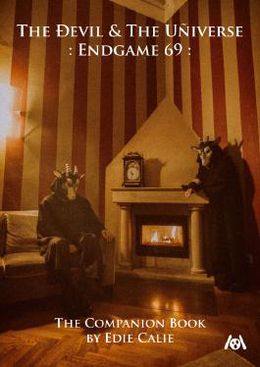
It’s a short story that frames the album. There are elements of the album in it, but the story also makes sense on its own. But I won’t reveal more here. The story is in German and English, as well as additional information about the album in German and English.
„Kali’s Tongue“: a mantra that was intensely, atmospherically, orientally sung and wonderfully implemented instrumentally. The goddess Kali stands for death, destruction but also for renewal. With these keywords, most listeners immediately create images in their heads. Please tell us something about the brand new video. (Was it clear that the second video for this song should be created, what basic ideas were there for the implementation, where was it shot…)
We’ve been considering for a long time which track should become the second single, and most ideas and images came to us with this track. It also happened that I had long wanted to work with an actor who should then take on the lead role in the video, and the goats themselves should be more like companions. The track was perfect for such an idea. It was clear to us that we needed a Kali character for this. We shot near Vienna. I won’t reveal exactly where. The shoot itself went late into the night but was one of the most interesting and relaxed shoots I’ve had so far.
The mentalist, mystery entertainer, and dark cabaret performer Thomas Thalhammer is an actor in the video. How did you come across this artist?
I’ve known Thomas for a long time and really like what he does. As mentioned earlier, we were looking for an actor for the video. We found the idea of having a man play a female goddess quite intriguing. Breaking down gender roles can never be advanced enough. He was immediately enthusiastic, and after the shoot, I can say the choice was spot on. But I never doubted it before. He embraced all our crazy ideas and also had creative input of his own that we could incorporate.
Your trademark is the masks. Photos, cover artwork, and your merchandise items bear an unmistakable „branding.“ This isn’t achieved by many bands. Spanish artist and DJ Billy Phobia creates the images for the T-shirts. Does he have „free rein“? I assume Billy gets to hear the album exclusively in advance and draws inspiration from it for a new print design?
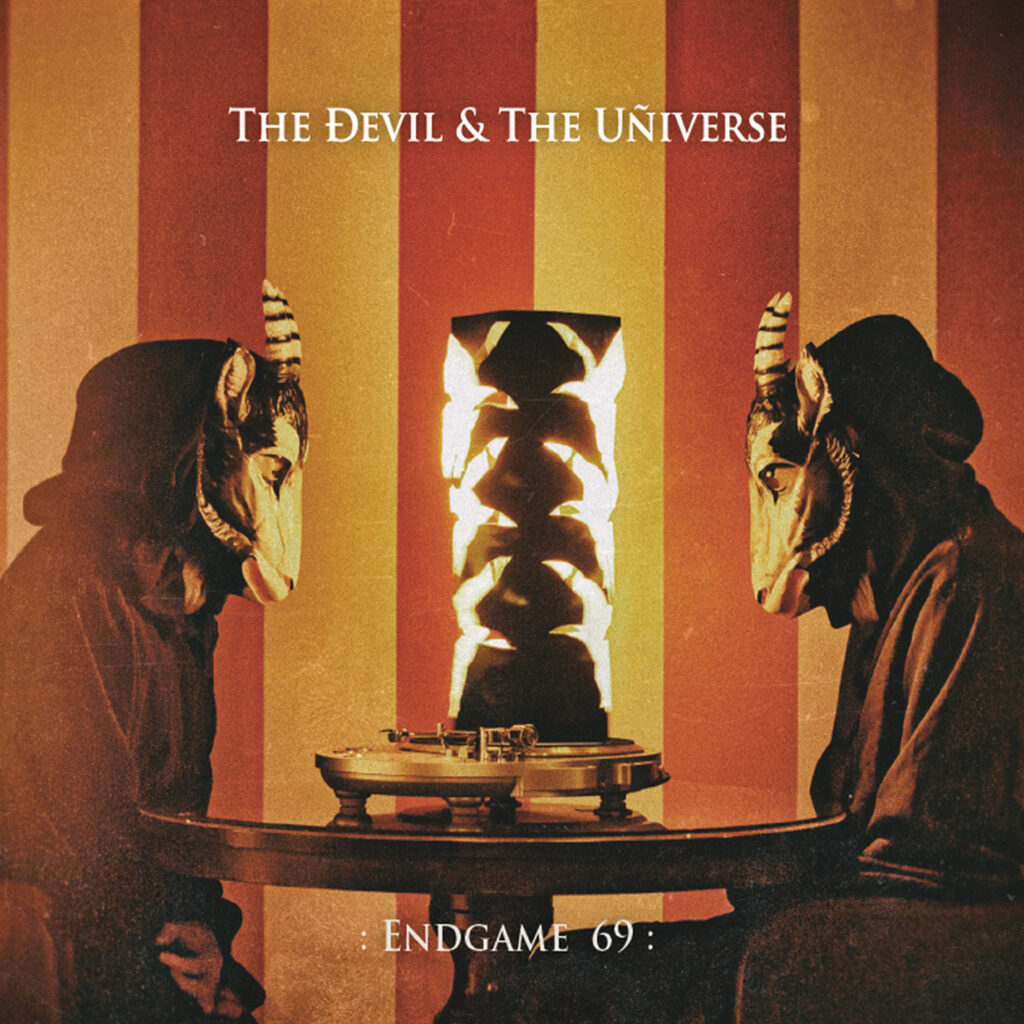
Thank you. And if I tell you that all this has come about very naturally without a big plan, that’s actually the truth. With Billy, we have a fantastic graphic designer who never fails to impress and surprise me. Every time a new T-shirt design awaits me in my inbox, it’s an exciting moment. And when I open it, I always let out a loud, positive „Ahhhhhhhhh.“ I tell him about the themes of the album beforehand and also send him the album itself. Sometimes I have a somewhat concrete idea already, like with the „Wicker Goat“ shirt from the Folk Horror album phase. It was supposed to be the Wicker Man film poster on a goat. But for the new design, it was all him. I consider it our best shirt design to date. For the cover photos, Maria Wagner is responsible and once again did a fantastic job. And last but not least, I must mention Filip Trax, who does the actual cover design; nothing happens without him in that regard.
Writing instrumental music and deliberately creating a mood on a subject without lyrics. I imagine that’s quite challenging. Do you have more experience with songwriting now? In the Sonic Seducer interview, you mentioned this is the longest production of a TDATU album so far. What are the backgrounds to that?
When someone asks me what kind of music we make, I always say it’s soundtrack music without the film. I think that describes it quite well. When I write music, I usually have images in my head. Translating those into music has always come fairly easily to me. Sometimes, as mentioned above, it takes a bit to find a musical language that does justice to the subject. For that, I read books on these topics, watch films or documentaries about them, take notes, and try to immerse myself completely in that mood. The rest comes naturally.
I’d like to confront you with statements about the „LSD Pope,“ „Alchemist of the Mind,“ alias Timothy Leary. From my perspective, he exemplifies the 60s/70s and drug use.
„The only hope is dope“: your initial thought on that. Of course, it’s crucial to distinguish which drugs Leary was referring to. He strictly meant psychedelic, mind-expanding drugs like LSD, psilocybin, etc. One must also put themselves in that time; people, especially Leary, truly believed they could fundamentally change the world with these consciousness-expanding substances. Many didn’t see LSD and the like as party drugs; it wasn’t just about having fun but about much more. So, this quote is likely understood in that context. Of course, Leary wasn’t a saint, it must be said, but they were experimenting with things on all levels.
„The man who turned on America“: your initial thought on that.
Certainly, without Leary, the interest in LSD wouldn’t have reached such proportions, I believe that can be said without doubt.
„T. Leary is a ‚prophet of consciousness expansion'“: too narrowly defined or does this statement comprehensively describe his actions?
I think the mistake Leary made was not realizing that this „consciousness expansion“ isn’t for everyone. There are people who simply can’t handle it, for various reasons. LSD isn’t a walk in the park or a cure-all either. He certainly overshot the mark there, but in the context of that time, it couldn’t have been any different. What’s interesting is that in recent years, LSD and similar substances are increasingly being used in psychotherapy again, with surprisingly positive results.
How intensively does Leary’s life contribute conceptually to „Endgame 69“?
You can’t make an album about that time without feeling his influence, but it’s not greater or smaller than other themes. The influences of the individual themes are very balanced.
You describe yourselves as a psychedelic band. Your tour radius is impressive. You travel a lot. Have there been any „psychedelic experiences“ during one of the many concerts, on, in front of, or behind the stage? Let’s intentionally go a bit „backstage“ (I mean primarily fans, concert-goers)
I can’t say whether concert-goers have had psychedelic experiences, but I’ve been told several times that our music has the potential in its best moments to transport people to other worlds. A TDATU concert is more like a ritual than a normal rock show, although we might be more of a rock band than others who call themselves that ;). My best moments on stage have always been very close to such experiences, yes. When suddenly everything moves in slow motion and despite the volume, it becomes completely silent, as if you’re in the eye of a hurricane. Those are the best moments. They’re very rare, but they exist, and yes, I would call them psychedelic.
The „Dream Machine Tour 2019/2020“ already has many dates. You’re a phenomenon; you’re booked for live concerts by organizers who don’t necessarily come from the Dark Wave scene. How has that been for you so far? Is your show well-received by the audience? (Vienna, Electronic Festival, the festival in the Baltic States…) What predominates from your observations: curiosity, dedication, astonishment, surprise? A mix of everything?
A mix of everything, but you always find that mix, no matter the audience. I think that’s what defines us, to evoke this range of emotions. I like that.
Imagine on this tour there’s an unlimited budget for the live performance. What would be the first acquisition you’d make to perform „Endgame 69“ according to your vision?
A 20m tall Dream Machine in the middle of the stage. And of course, our own chef.
Thank you for answering the questions!
Long live the goats😉 I’ll be there for the next demo!
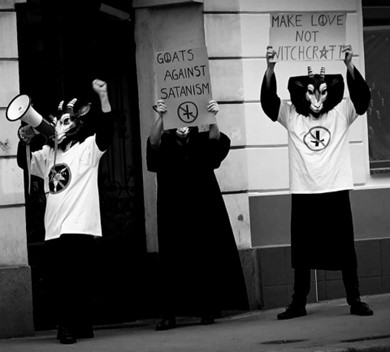
.
.

